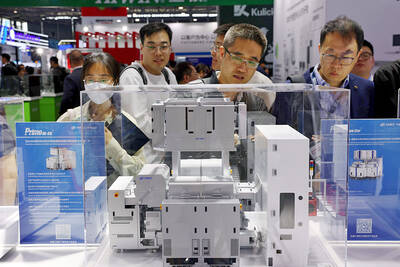Restaurant operator Hi-Lai Foods Co Ltd (漢來美食) yesterday said that it plans to open three new restaurants in November amid steady sales growth this year.
“We plan to open one vegetarian and one hot pot restaurant in Kaohsiung’s Hanshin Department Store (漢神百貨), and a dumpling restaurant in Taoyuan’s Taimall Family Entertainment Shopping Mall (台茂購物中心) later this year,” a public relations official told the Taipei Times by telephone.
The third, a vegetarian restaurant, would serve dishes with the “five pungent spices” — onions, garlic, chives, green onions and leeks — and aims to differentiate itself from Hi-Lai’s seven existing vegetarian restaurants that do not provide the pungent vegetables, said the official, who asked to remain anonymous.
Hi-Lai as of last month operated 38 regular chain restaurants in Taiwan, two franchises in Shanghai and one in Bangkok, she said, adding that the company is evaluating new opportunities in Shanghai.
Consolidated revenue last month rose 12.64 percent year-on-year to NT$310.2 million (US$9.95 million), with cumulative revenue up 7.53 percent to NT$1.9 billion in the first six months, thanks to contributions from the opening of the fourth and fifth outlets of Cantonese restaurant Celebrity Cuisine (名人坊) in Taipei, the company said on Monday.
The renovated Harbour Restaurant (漢來海港) in Kaohsiung’s Grand Hi-Lai Hotel (漢來大飯店) and another restaurant in Taichung’s Kuang San Sogo Department Store (廣三SOGO) also attracted customers and contributed to sales, the company said.
Harbour Restaurant contributed 51 percent of Hi-Lai’s sales last year, while International Banquet Hall (漢來宴會廳), Celebrity Cuisine, Hi-Lai Vegetarian Restaurant and Cantonese Jade Garden Restaurant (翠園) made up about 39 percent, it said.
Hi-Lai shares closed up 0.35 percent at NT$144 in Taipei trading yesterday, up 16.6 percent so far this year.

With this year’s Semicon Taiwan trade show set to kick off on Wednesday, market attention has turned to the mass production of advanced packaging technologies and capacity expansion in Taiwan and the US. With traditional scaling reaching physical limits, heterogeneous integration and packaging technologies have emerged as key solutions. Surging demand for artificial intelligence (AI), high-performance computing (HPC) and high-bandwidth memory (HBM) chips has put technologies such as chip-on-wafer-on-substrate (CoWoS), integrated fan-out (InFO), system on integrated chips (SoIC), 3D IC and fan-out panel-level packaging (FOPLP) at the center of semiconductor innovation, making them a major focus at this year’s trade show, according

DEBUT: The trade show is to feature 17 national pavilions, a new high for the event, including from Canada, Costa Rica, Lithuania, Sweden and Vietnam for the first time The Semicon Taiwan trade show, which opens on Wednesday, is expected to see a new high in the number of exhibitors and visitors from around the world, said its organizer, SEMI, which has described the annual event as the “Olympics of the semiconductor industry.” SEMI, which represents companies in the electronics manufacturing and design supply chain, and touts the annual exhibition as the most influential semiconductor trade show in the world, said more than 1,200 enterprises from 56 countries are to showcase their innovations across more than 4,100 booths, and that the event could attract 100,000 visitors. This year’s event features 17

Germany is to establish its first-ever national pavilion at Semicon Taiwan, which starts tomorrow in Taipei, as the country looks to raise its profile and deepen semiconductor ties with Taiwan as global chip demand accelerates. Martin Mayer, a semiconductor investment expert at Germany Trade & Invest (GTAI), Germany’s international economic promotion agency, said before leaving for Taiwan that the nation is a crucial partner in developing Germany’s semiconductor ecosystem. Germany’s debut at the international semiconductor exhibition in Taipei aims to “show presence” and signal its commitment to semiconductors, while building trust with Taiwanese companies, government and industry associations, he said. “The best outcome

Semiconductor equipment billings in Taiwan are expected to double this year, as manufacturers in the industry are keen to expand production to meet strong global demand for artificial intelligence applications, according to SEMI, which represents companies in the electronics manufacturing and design supply chain. Speaking at a news conference before the opening of Semicon Taiwan trade show tomorrow, SEMI director of industry research and statistics Clark Tseng (曾瑞榆) said semiconductor equipment billings in Taiwan are expected to grow by an annual 100 percent this year, beating an earlier estimate of 70 percent growth. He said that Taiwan received a boost from a